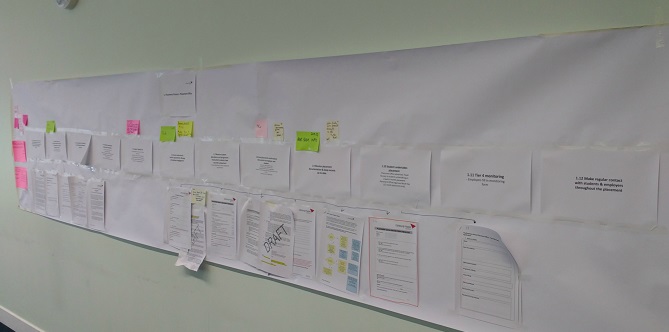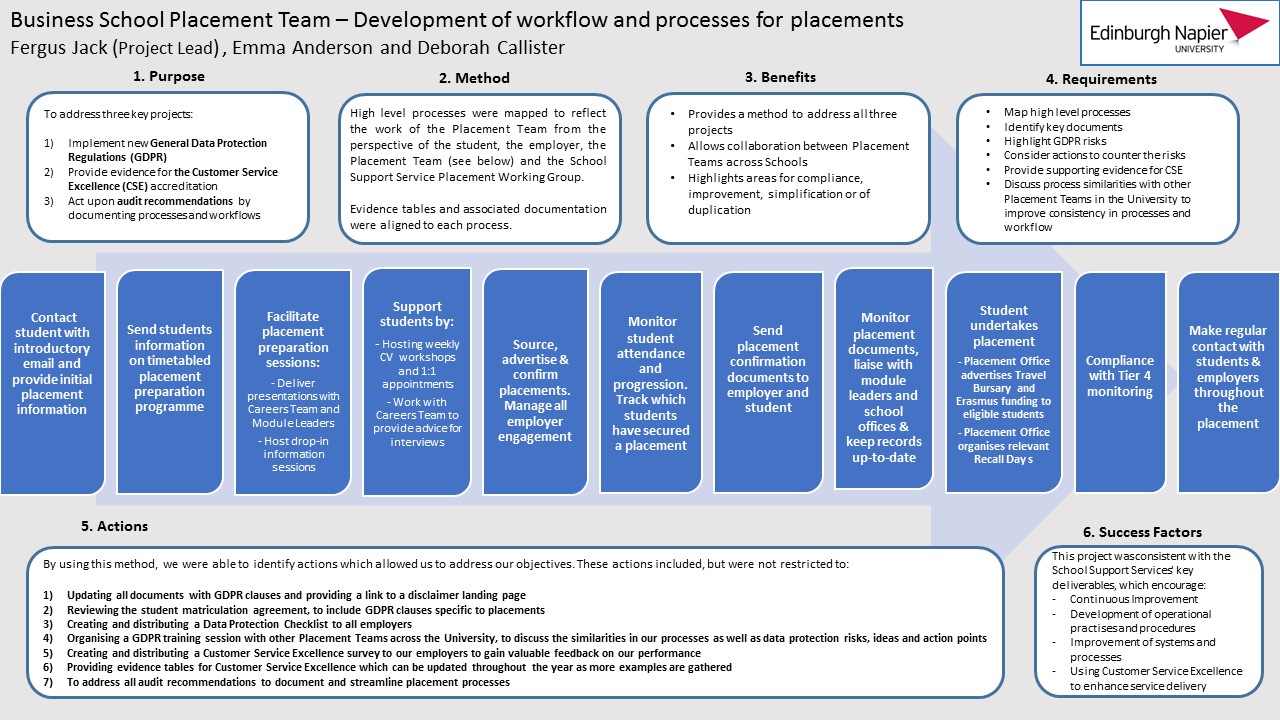When a team at Edinburgh Napier University needed to carry out three time consuming projects at the same time, they turned to process mapping. In this case study, project lead Fergus Jack describes the process and how it allowed the projects to be tackled simultaneously in a time efficient way.
The Business School Placement Team at Edinburgh Napier University is responsible for supporting student engagement in accredited work-based learning. The team strives to enhance student employability by developing opportunities available for students to interact with local, UK and global businesses. They lead regular employability workshops, in collaboration with the careers team, and 1:1 sessions which provide students with comprehensive and personalised placement support.
Background
In May 2017 the Business School Placement Team was required to address three key projects:
- To implement the new EU General Data Protection Regulations (GDPR) before the deadline of May 2018. These regulations aim to protect EU citizens from privacy and personal data breaches, including when their personal data is used outside of the EU. The regulatory changes place emphasis on the role of the data controller, who now has direct accountability obligations and must demonstrate GDPR compliance from the outset.
- To provide supporting evidence for the School Support Service’s application for the Customer Service Excellence (CSE) accreditation. This standard was designed by the UK government to motivate organisations to adopt a customer-focused approach. It aims to encourage continuous improvement, skills development and successful customer service delivery.
- To act upon placement audit recommendations by documenting its team’s processes and workflows.
Considered separately, these were potentially time-consuming projects to implement. Due to the significant amount of documentation already involved in the placement process, the prospect of applying the new GDPR changes was particularly daunting. However, on reflection it became evident that the projects shared similar requirements in terms of actions and evidence, and could therefore be addressed simultaneously by using an approach which focused on process mapping.
Approach
High level processes were mapped as linear flowcharts to reflect the workflow of the placement team from four fundamental perspectives:
- The student – from attending placement preparation sessions and sending applications, to securing and undertaking a placement.
- The employer – from developing employer contacts and advertising placements on behalf of these organisations, to sending confirmation paperwork and collecting feedback.
- The placement team – from initial contact with students and employers, to providing support before and during the placement.
- The School Support Service Placement Working Group – from establishing the purpose of the group, to collaborating on projects and sharing best practise.
Associated placement documents were then aligned to each process and displayed in evidence tables which accompanied the flowcharts. Other evidence of standard correspondence with customers was also gathered for each step, such as email templates, sample placement advertisements and social media screenshots. These documents were then used to provide evidence for the Customer Service Excellence (CSE) accreditation, as well as contributing towards the GDPR project.
A specialised session for the School Support Service Placement Working Group, dedicated to GDPR implementation, was organised and co-led by the Business School Placement Team and representatives from the University’s Governance Service. All four flowcharts were printed and displayed in the session as large posters. The relevant documents for each flowchart were also printed and attached below the processes they corresponded to.
The size, clarity and simplicity of the flowcharts allowed the participants to easily interact with the processes and attachments, using post-it notes to provide suggestions and commentary. During the session the Placement Teams discussed and highlighted potential data protection risks, ideas for compliance and action points.
- As a result of this session, the Business School Placement Team, with guidance from the Governance Service, were able to clarify and begin working towards action points which would ensure GDPR compliance. These actions included, but were not restricted to:
- Updating all documents with GDPR clauses and providing a link to a disclaimer landing page.
- Reviewing the university’s student matriculation agreement to include GDPR clauses specific to placements.
- Creating and distributing a data protection checklist to all employers.
In addition, action points to address customer service excellence were established, such as:
- Creating and distributing a customer service excellence survey to all employers to gain valuable feedback on the placement team’s performance.
- Providing evidence tables for customer service excellence which could be updated throughout the year as more examples are gathered.
Outcomes
By mapping the team’s high-level processes and providing evidence in the form of documents, templates and communication, the original project objectives were addressed in the following ways:
- General Data Protection Regulations (GDPR) – Action points were created and will be implemented, with support from the Governance Service, in advance of the deadline.
- Customer Service Excellence (CSE) – CSE evidence was gathered and displayed effectively in order to contribute towards the School Support Service’s accreditation application.
- Placement audit requirements – The team’s processes and procedures were clearly mapped, from multiple perspectives, and evidence tables provided more detailed examples.
Success Factors
This process-focused approach was successful because:
- It provided a simple and direct method to address all three projects at once.
- It encouraged the team to assess its high-level processes and procedures.
- It allowed the team to reflect on the placement programme from the perspective of its customers and colleagues.
- It stimulated conversation and collaboration between Placement Teams across the University.
- The GDPR session received positive feedback from all participants. Comments included:
- “Good to know that we’re all on the same page with our processes and that GDPR implementation is not as complicated as first thought”
- “Really useful session on how to implement GDPR regulations. Developing placement processes and maps have proved useful for complying with audit requirements and CSE as well.”
- It was consistent with the School Support Service’s key deliverables, which encourage: continuous improvement, development of operational practises and procedures, and using Customer Service Excellence to enhance service delivery.
Contact Details
Fergus Jack, school support administrator (Placement Support) at Edinburgh Napier University, F.Jack@napier.ac.uk
Acknowledgements: With thanks to Steve Yorkstone, Diana Watt and the Placement Teams from Edinburgh Napier University for their support and input.






